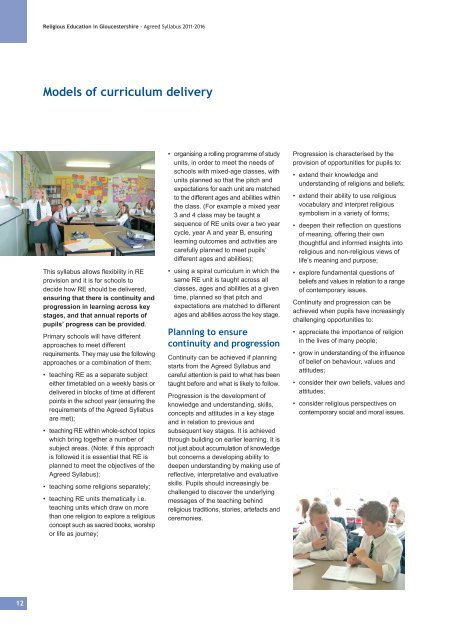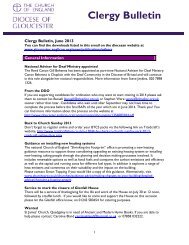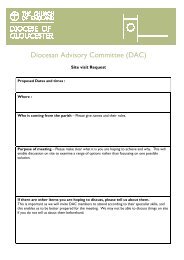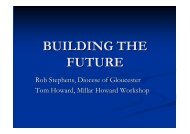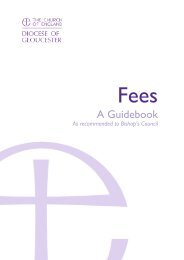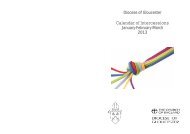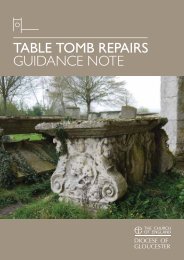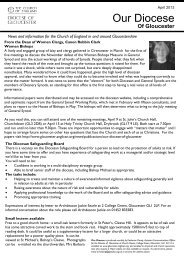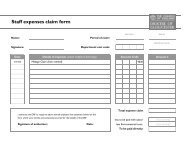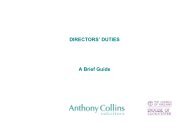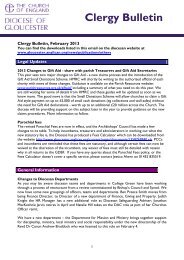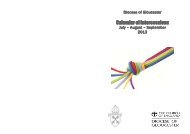Download the Revised RE Syllabus 2011 - Diocese of Gloucester
Download the Revised RE Syllabus 2011 - Diocese of Gloucester
Download the Revised RE Syllabus 2011 - Diocese of Gloucester
Create successful ePaper yourself
Turn your PDF publications into a flip-book with our unique Google optimized e-Paper software.
Religious Education in <strong>Gloucester</strong>shire - Agreed <strong>Syllabus</strong> <strong>2011</strong>-2016<br />
Models <strong>of</strong> curriculum delivery<br />
This syllabus allows flexibility in <strong>RE</strong><br />
provision and it is for schools to<br />
decide how <strong>RE</strong> should be delivered,<br />
ensuring that <strong>the</strong>re is continuity and<br />
progression in learning across key<br />
stages, and that annual reports <strong>of</strong><br />
pupils’ progress can be provided.<br />
Primary schools will have different<br />
approaches to meet different<br />
requirements. They may use <strong>the</strong> following<br />
approaches or a combination <strong>of</strong> <strong>the</strong>m:<br />
• teaching <strong>RE</strong> as a separate subject<br />
ei<strong>the</strong>r timetabled on a weekly basis or<br />
delivered in blocks <strong>of</strong> time at different<br />
points in <strong>the</strong> school year (ensuring <strong>the</strong><br />
requirements <strong>of</strong> <strong>the</strong> Agreed <strong>Syllabus</strong><br />
are met);<br />
• teaching <strong>RE</strong> within whole-school topics<br />
which bring toge<strong>the</strong>r a number <strong>of</strong><br />
subject areas. (Note: if this approach<br />
is followed it is essential that <strong>RE</strong> is<br />
planned to meet <strong>the</strong> objectives <strong>of</strong> <strong>the</strong><br />
Agreed <strong>Syllabus</strong>);<br />
• teaching some religions separately;<br />
• teaching <strong>RE</strong> units <strong>the</strong>matically i.e.<br />
teaching units which draw on more<br />
than one religion to explore a religious<br />
concept such as sacred books, worship<br />
or life as journey;<br />
• organising a rolling programme <strong>of</strong> study<br />
units, in order to meet <strong>the</strong> needs <strong>of</strong><br />
schools with mixed-age classes, with<br />
units planned so that <strong>the</strong> pitch and<br />
expectations for each unit are matched<br />
to <strong>the</strong> different ages and abilities within<br />
<strong>the</strong> class. (For example a mixed year<br />
3 and 4 class may be taught a<br />
sequence <strong>of</strong> <strong>RE</strong> units over a two year<br />
cycle, year A and year B, ensuring<br />
learning outcomes and activities are<br />
carefully planned to meet pupils’<br />
different ages and abilities);<br />
• using a spiral curriculum in which <strong>the</strong><br />
same <strong>RE</strong> unit is taught across all<br />
classes, ages and abilities at a given<br />
time, planned so that pitch and<br />
expectations are matched to different<br />
ages and abilities across <strong>the</strong> key stage.<br />
Planning to ensure<br />
continuity and progression<br />
Continuity can be achieved if planning<br />
starts from <strong>the</strong> Agreed <strong>Syllabus</strong> and<br />
careful attention is paid to what has been<br />
taught before and what is likely to follow.<br />
Progression is <strong>the</strong> development <strong>of</strong><br />
knowledge and understanding, skills,<br />
concepts and attitudes in a key stage<br />
and in relation to previous and<br />
subsequent key stages. It is achieved<br />
through building on earlier learning. It is<br />
not just about accumulation <strong>of</strong> knowledge<br />
but concerns a developing ability to<br />
deepen understanding by making use <strong>of</strong><br />
reflective, interpretative and evaluative<br />
skills. Pupils should increasingly be<br />
challenged to discover <strong>the</strong> underlying<br />
messages <strong>of</strong> <strong>the</strong> teaching behind<br />
religious traditions, stories, artefacts and<br />
ceremonies.<br />
Progression is characterised by <strong>the</strong><br />
provision <strong>of</strong> opportunities for pupils to:<br />
• extend <strong>the</strong>ir knowledge and<br />
understanding <strong>of</strong> religions and beliefs;<br />
• extend <strong>the</strong>ir ability to use religious<br />
vocabulary and interpret religious<br />
symbolism in a variety <strong>of</strong> forms;<br />
• deepen <strong>the</strong>ir reflection on questions<br />
<strong>of</strong> meaning, <strong>of</strong>fering <strong>the</strong>ir own<br />
thoughtful and informed insights into<br />
religious and non-religious views <strong>of</strong><br />
life’s meaning and purpose;<br />
• explore fundamental questions <strong>of</strong><br />
beliefs and values in relation to a range<br />
<strong>of</strong> contemporary issues.<br />
Continuity and progression can be<br />
achieved when pupils have increasingly<br />
challenging opportunities to:<br />
• appreciate <strong>the</strong> importance <strong>of</strong> religion<br />
in <strong>the</strong> lives <strong>of</strong> many people;<br />
• grow in understanding <strong>of</strong> <strong>the</strong> influence<br />
<strong>of</strong> belief on behaviour, values and<br />
attitudes;<br />
• consider <strong>the</strong>ir own beliefs, values and<br />
attitudes;<br />
• consider religious perspectives on<br />
contemporary social and moral issues.<br />
12


